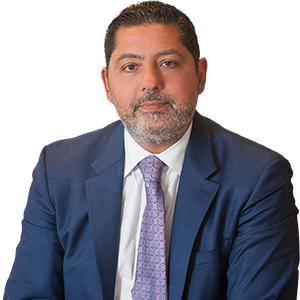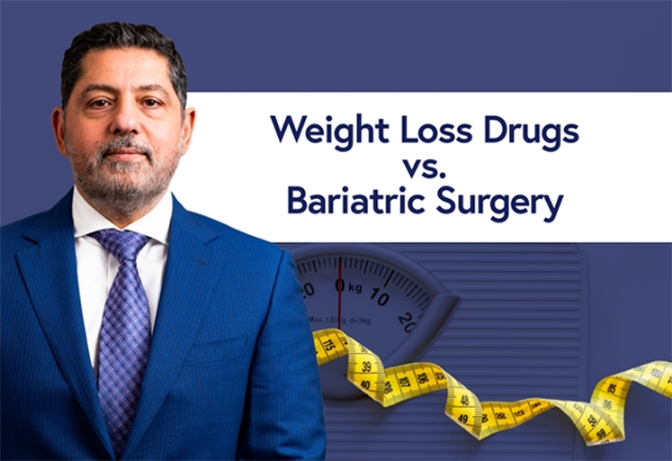Weight Loss Drugs vs. Bariatric Surgery – Which is Right For You?
If you’re trying to lose weight and finding it difficult, you may have considered taking medications or undergoing bariatric surgery. Both of these... read more
Call Us Today (732) 640-5316
E-Waiting RoomThe esophagus is the tube that carries food and liquids from the mouth into the stomach. The wall of the esophagus is composed of layers of muscle that propel food to the stomach by rhythmic waves of contractions called peristalsis. There are muscle rings at each end of the esophagus, – called sphincters. These sphincters open to allow food to move forward and then close to prevent food and acid from moving backward, helping prevent acid reflux and aspiration or choking.
Upon swallowing, the upper esophageal sphincter opens and the esophageal muscles contract to push food downward. The lower esophageal sphincter opens temporarily to allow food to pass into the stomach. Then the sphincter closes to prevent food and stomach acid from flowing back up the esophagus.
Gastroesophageal reflux disease (GERD) is a common chronic disease where the acid from the stomach comes back up into the esophagus. The anatomical barriers that keep stomach acid from flowing upward are the lower esophageal sphincter and the diaphragm. Symptoms include heartburn (acid indigestion), chest pain, regurgitation, and hoarseness.
A Hiatal Hernia is an opening of the diaphragm that allows part of the stomach to slide into the chest. Another name for hiatal hernia is a paraesophageal hernia. A hiatal hernia can contribute to or worsen symptoms of GERD. A hiatal hernia can be seen on an endoscopy, X-rays, and CT scans among other studies. Hiatal hernias can allow abdominal organs to go up into the chest and sometimes cause damage to organs. The risks and benefits of a hiatal hernia repair should be discussed with your doctor.
When GERD constantly irritates the esophagus, it can damage the lining of the esophagus and result in Barrett’s esophagus, a precancerous condition. About 8% of people with GERD go on to develop Barrett’s esophagus.
Esophageal cancer accounts for 3% of cancer deaths in the U.S. Symptoms of esophageal cancer include difficulty swallowing, painful swallowing, chest pain, worsening GERD, cough, or weight loss. Risk factors include GERD, Barrett’s esophagus, obesity, smoking, and alcohol consumption. There are two primary types of esophageal cancer –adenocarcinoma or squamous cell carcinoma. Squamous cell carcinoma involves the upper and mid esophagus and is the most common esophageal cancer worldwide. Adenocarcinoma involves the lower esophagus and is the most common type in the United States.
Achalasia is a rare disease of the esophagus where people have difficulty swallowing because the muscles of the esophagus fail to relax and allow food to pass into the stomach. It is believed to be caused by a malfunction of the nerves in the esophagus.
Both GERD and Achalasia are related to a malfunction of the esophageal sphincters.
Dr. Donaire and the staff at this office is amazing! I just had surgery on June 2nd and with listening to all instructions I am already down 10lbs. Dr. Donaire answers all questions and concerns with no hesitation. Thank you so much and I can’t wait to see my journey!
Kiarrie G.A barium swallow is a test where x-rays of the esophagus are taken while the patient swallows a solution called barium. Esophageal contractions and the lower sphincter are visible in real-time. With Achalasia the normal contractions are missing, and the esophagus is enlarged above a narrowing at the lower sphincter.
Endoscopy is a test that allows the surgeon to visualize the inside of the esophagus, the stomach, and the first portion of the small intestine. Endoscopy is performed using a thin flexible tube with a small light and camera on the end.
This test uses X-rays to create cross-sectional images of the body. It can detect hiatal hernias and cancer among other esophageal disorders.
Manometry and pH testing may be necessary for diagnosing certain esophageal disorders. pH testing measures the acid levels in the esophagus while manometry measures the movement and pressures in the esophagus.
Treatment may involve a change in diet, medication, surgery, and ablation treatments. Chemotherapy, radiation, and surgery are used to treat cancer. At Advanced Surgical and Bariatrics of NJ, our team of elite surgeons is knowledgeable, attentive, and thorough, as well as kind, compassionate, and professional. You will receive a comprehensive evaluation and a personalized treatment plan.

Dr. Ragui Sadek is a premier surgeon who established a state-of-the-art and one of the safest bariatric surgery programs in the state. Dr. Sadek has fellowship training in both laparoscopic/bariatric surgery and surgical trauma/critical care, allowing him to safely perform complex surgeries on patients who have been turned down by other practices. As a Clinical Assistant Professor of surgery at RWJ Medical School & the Director of bariatric surgery program at RWJ University Hospital, Dr. Sadek offers a cutting-edge range of laparoscopic, robotic, & bariatric surgical procedures with a complication rate substantially below the national average.
Dr. Sadek is a Clinical Assistant Professor of Surgery at Rutgers-Robert Wood Johnson Medical School and a Fellow of the American College of Surgeons. Having performed more than three thousand advanced surgical procedures, Dr. Sadek has established a strong patient satisfaction rate and a solid reputation among the surgical community and is renowned as a top physician in his field by International Association of Healthcare Professionals. As a board-certified surgeon, he holds affiliations with the American Society of Metabolic and Bariatric Surgery and the Society of American Gastro Endoscopic Surgeons. More about Dr. Sadek
Stay current with Advanced Surgical & Bariatrics of New Jersey

If you’re trying to lose weight and finding it difficult, you may have considered taking medications or undergoing bariatric surgery. Both of these... read more

Are you frustrated with your inability to lose weight? Tired of being trapped in an endless cycle of yo-yo dieting, over-exercising, cleanses, and... read more